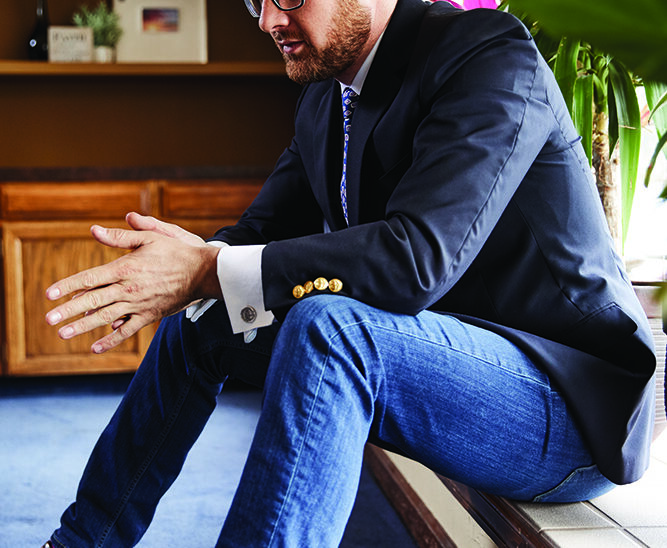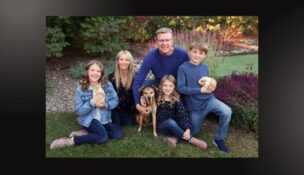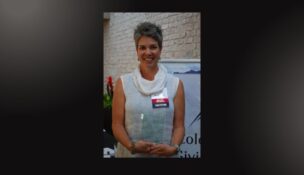Cortland Maters-Suter was 13 when he took the swig from his parents' liquor cabinet that would change his life. For the next 10 years, he drank, drugged, stole and lied, finally ending up in a behavior modification program in Arizona that traumatized him even as it got him sober.
"My own experience seeing some of the abuses that could happen when you go too far into the behavioral mod direction really got me interested in designing my own treatment center," says Mathers-Suter, who earned a master's in social work from Case Western Reserve University.
In April 2015, Mathers-Suter opened AspenRidge Recovery Center in Lakewood, and has since opened a branch in Fort Collins. The centers offer in-patient and out-patient treatment for an average of 90 days; the Affordable Care Act requires insurance coverage for drug and alcohol treatment, so it can be covered.
The youngest of fie in a well-to-do family, Mathers-Suter credits his father, a successful businessman himself, with helping him realize his vision for his centers.
"I stole from him, I pawned family heirlooms passed down to him, I lied," he says. "And when I started this facility, every step of the way, he was there with me. He sent me the four 'Business For Dummies' books, and said 'If you really want to be successful, read these.' Then he'd send me four or five more."
"As we started to grow, he continued to be the guy in the back room. He's really been the person to help me, and in doing so, he's become my closest friend."
COLORADOBIZ: "HOW DID YOU GO FROM BEING A DRUG USER YOURSELF TO RUNNING YOUR OWN TREATMENT CENTERS?"
CORTLAND MATHERS-SUTER: "I went to graduate school, and while doing that, I was working in these different rehab facilities, and they were all lacking terrible in some basic things. They were looking at the insurance benefits and what they could get and then tailoring their treatments to maximize their returns from insurance companies. It made me really angry. I got heavily involved in the research for the design and curricula that would force them to actually spend money on their clients. A person in my grad program and I decided we were going to do it on our own."
CB: HOW'S THAT WORKING OUT FOR YOU?
CMS: Wonderfully. In Denver, we have 54 clients. In Fort Collins, we have close to 20. from an interest-in-our-services perspective, it's exploded over the past few years. It's a weird industry, because it goes in waves. You go through periods of time when nobody wants to get sober. Like right before Christmas, this place will be a ghost town. Then January comes, and it takes a few weeks into January, because that's the bargaining period between the addict and the family member. Then, finally, they really screw up, and then they come to us.
CB: ARE YOU A LAST RESORT? IS THIS WHERE PEOPLE COME WHEN THEY HAVE TRIED EVERYTHING ELSE?
CMS: Because we don’t do detox, half the time, we’re the last resort, and half the time, we’re the first stop. You go into our all-day partial hospitalization program, we’re your last resort. You have tried everything: You’ve tried waiting till 5 to drink, you’ve tried hiding your heroin from yourself, you’ve done everything you can, and it’s gotten to the point where you’re incapable of surviving without support. On the other hand, you get people in our evening intensive out-patient program, and those are folks who know there’s something wrong, they think they can keep their life generally intact. Some of them are right, some of them are wrong.
CB: THE OPIOID CRISIS HAS BEEN DECLARED A PUBLIC HEALTH EMERGENCY. WHAT'S YOUR TAKE ON WHAT THAT'S GOING TO MEAN?
CMS: For our industry, that’s been (President Trump’s) most egregious action, was promising us a national health emergency, which would have immediately opened up funding. Whereas the public health emergency is let’s gather a bunch of information but not really do anything, and continue to protect big pharma and these pain clinics and doctors.
CB: WAVE YOUR MAGIC WAND AND YOU CAN HAVE ANYTHING YOU WANT TO FIX THIS. WHAT WOULD YOU DO?
CMS: Human nature combined with culture suggests that we’ll always have an addiction problem. The opioid epidemic, though, is something the government has a real responsibility to deal with, as well as private and public industry. You also have a huge responsibility for the pharmaceutical companies. If pharmaceutical companies were forced to appropriate a certain amount to treat the people who are addicted to the drugs you’d see a lot more people getting sober.
CB: YOU TALK ABOUT YOURSELF AS A RECOVERING ADDICT. HOW DOES YOUR OWN EXPERIENCE AS AN ADDICT INFORM YOUR WORK
CMS: For me, it’s about using my experience to guide the way I manage my team so that they can manage our clients in a way that focuses on the individual and the treatment they personally need. We’re treating addiction, we’re treating mental health, but we’re also always treating guilt, we’re always treating shame, we’re always treating fear. We look at those as the primary issues, because those are the motivators that drive people back into addiction every time. CB: Is recovery something that you struggle with now? Is it always there?
CMS: I don’t struggle with a desire to use drugs. It’s more like, at AA we talk about selfishness and self-centeredness — this self-centered fear and need to act out of that fear. It’s fear of not being good enough, stuff that everybody grapples with. But for us, it’s chronic, constant, pervasive. For me, it’s making sure I’m living with integrity. I still attend AA meetings, I still go to therapy, I still make amends to people when I screw up. When I’m not the boss I should be, I go to my staff and own my mistakes.
CB: SAY I'M SOMEONE WHO HAS A FRIEND OR RELATIVE WHO'S ADDICTED. I WANT TO HELP. WHAT SHOULD I DO?
CMS: You want to pick up the phone and actually start talking to somebody. We insulate ourselves to try to protect ourselves and our families. It’s always at the expense of our loved one who actually needs help. When I was in treatment, my family was embarrassed to talk about where I was. I didn’t need that protection. I think we have to pry ourselves away from our desire to protect our egos. At the end of the day, this is life or death.


























